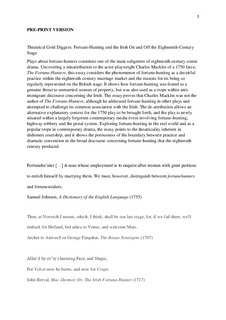| dc.contributor.author | Goring, Paul Michael | |
| dc.date.accessioned | 2018-08-21T11:03:05Z | |
| dc.date.available | 2018-08-21T11:03:05Z | |
| dc.date.created | 2018-08-20T13:19:39Z | |
| dc.date.issued | 2018 | |
| dc.identifier.issn | 0034-6551 | |
| dc.identifier.uri | http://hdl.handle.net/11250/2558692 | |
| dc.description.abstract | Plays about fortune-hunters constitute one of the main subgenres of eighteenth-century comic drama. Uncovering a misattribution to the actor-playwright Charles Macklin of a 1750 farce, The Fortune-Hunters, this essay considers the phenomenon of fortune-hunting as a deceitful practice within the eighteenth-century marriage market and the reasons for its being so regularly represented on the British stage. It shows how fortune-hunting was feared as a genuine threat to unmarried women of property, but was also used as a trope within anti-immigrant discourse concerning the Irish. The essay proves that Charles Macklin was not the author of The Fortune-Hunters, although he addressed fortune-hunting in other plays and attempted to challenge its common association with the Irish. The de-attribution allows an alternative explanatory context for the 1750 play to be brought forth, and the play is newly situated within a largely forgotten contemporary media event involving fortune-hunting, highway robbery and the penal system. Exploring fortune-hunting in the real world and as a popular trope in contemporary drama, the essay points to the theatricality inherent in dishonest courtship, and it shows the porousness of the boundary between practice and dramatic convention in the broad discourse concerning fortune-hunting produced by the eighteenth century. | nb_NO |
| dc.language.iso | eng | nb_NO |
| dc.publisher | Oxford University Press (OUP) | nb_NO |
| dc.title | Theatrical Gold Diggers: Fortune-Hunting and the Irish on and off the Eighteenth-Century Stage | nb_NO |
| dc.type | Journal article | nb_NO |
| dc.description.version | submittedVersion | nb_NO |
| dc.source.journal | Review of English Studies | nb_NO |
| dc.identifier.doi | 10.1093/res/hgy066 | |
| dc.identifier.cristin | 1603239 | |
| dc.description.localcode | This is a submitted manuscript of an article published by Oxford University Press in Review of English Studies, 08 August 2018 | nb_NO |
| cristin.unitcode | 194,62,60,0 | |
| cristin.unitname | Institutt for språk og litteratur | |
| cristin.ispublished | true | |
| cristin.fulltext | preprint | |
| cristin.qualitycode | 2 | |
